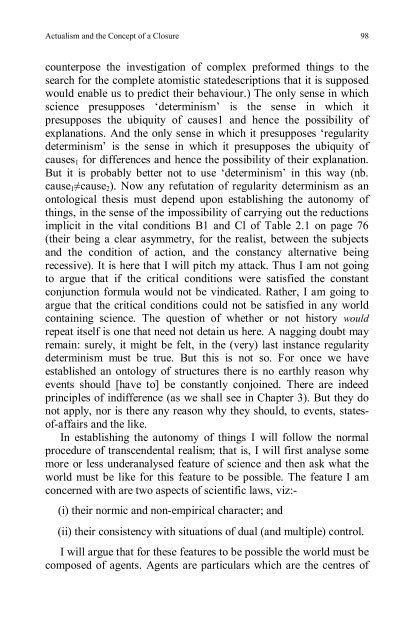A Realist Theory of Science Roy Bhaskar
A Realist Theory of Science Roy Bhaskar
A Realist Theory of Science Roy Bhaskar
Create successful ePaper yourself
Turn your PDF publications into a flip-book with our unique Google optimized e-Paper software.
Actualism and the Concept <strong>of</strong> a Closure 98<br />
counterpose the investigation <strong>of</strong> complex preformed things to the<br />
search for the complete atomistic statedescriptions that it is supposed<br />
would enable us to predict their behaviour.) The only sense in which<br />
science presupposes ‘determinism’ is the sense in which it<br />
presupposes the ubiquity <strong>of</strong> causes1 and hence the possibility <strong>of</strong><br />
explanations. And the only sense in which it presupposes ‘regularity<br />
determinism’ is the sense in which it presupposes the ubiquity <strong>of</strong><br />
causes1 for differences and hence the possibility <strong>of</strong> their explanation.<br />
But it is probably better not to use ‘determinism’ in this way (nb.<br />
cause1≠cause2). Now any refutation <strong>of</strong> regularity determinism as an<br />
ontological thesis must depend upon establishing the autonomy <strong>of</strong><br />
things, in the sense <strong>of</strong> the impossibility <strong>of</strong> carrying out the reductions<br />
implicit in the vital conditions B1 and Cl <strong>of</strong> Table 2.1 on page 76<br />
(their being a clear asymmetry, for the realist, between the subjects<br />
and the condition <strong>of</strong> action, and the constancy alternative being<br />
recessive). It is here that I will pitch my attack. Thus I am not going<br />
to argue that if the critical conditions were satisfied the constant<br />
conjunction formula would not be vindicated. Rather, I am going to<br />
argue that the critical conditions could not be satisfied in any world<br />
containing science. The question <strong>of</strong> whether or not history would<br />
repeat itself is one that need not detain us here. A nagging doubt may<br />
remain: surely, it might be felt, in the (very) last instance regularity<br />
determinism must be true. But this is not so. For once we have<br />
established an ontology <strong>of</strong> structures there is no earthly reason why<br />
events should [have to] be constantly conjoined. There are indeed<br />
principles <strong>of</strong> indifference (as we shall see in Chapter 3). But they do<br />
not apply, nor is there any reason why they should, to events, states<strong>of</strong>-affairs<br />
and the like.<br />
In establishing the autonomy <strong>of</strong> things I will follow the normal<br />
procedure <strong>of</strong> transcendental realism; that is, I will first analyse some<br />
more or less underanalysed feature <strong>of</strong> science and then ask what the<br />
world must be like for this feature to be possible. The feature I am<br />
concerned with are two aspects <strong>of</strong> scientific laws, viz:-<br />
(i) their normic and non-empirical character; and<br />
(ii) their consistency with situations <strong>of</strong> dual (and multiple) control.<br />
I will argue that for these features to be possible the world must be<br />
composed <strong>of</strong> agents. Agents are particulars which are the centres <strong>of</strong>


